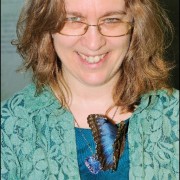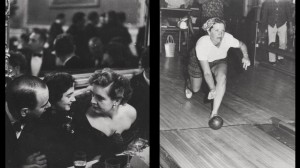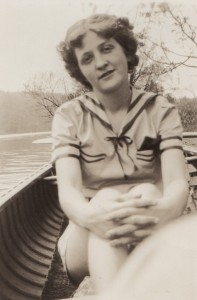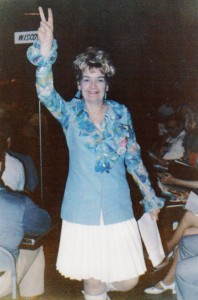Micro-History: Our Grandmothers, Our Selves

Julia Barclay-Morton
While researching and writing, The Amazing True Imaginary Autobiography of Dick & Jani, a book about my grandmothers, both born in 1916 (before women had the right to vote) but who cut very different paths through the 20th Century, I got in touch with historian, Jill Lepore.
She had written a lovely piece in the New Yorker about her relationship to her mother as it related to her writing the biography of Jane Franklin (Ben’s sister), The Book of Ages (an astonishing feat of both historical research and imagination).
She suggested, in relation to my own book, that I read an article she had written in the 1980s ‘Historians Who Love too Much’ in which she discussed the term micro-history, which is distinguished from biography by generally using as its subject lesser-known people.
The micro-historian generally focuses her attention on people who can illuminate the socio-historical context of the period from ground level. Lived history. This term was liberating in that it gave a name to what I was groping for intuitively.

Jani and Dick
While the process of writing this book has been difficult at times because of the personal material involved (and separating myself from that material in the earlier phase seemed almost impossible), the more I allowed my own prejudices and fears to drop away and see through my grandmothers’ eyes – the more I understood that their stories had not been heard. Not only my grandmothers, but this whole generation of women have not had their voices reckoned with in our accounting of the 20th Century.
As I began to piece together all the photos, writing and documents for both women, I began to understand that their story was more than I had suspected, not only because no one’s life is as simple as it may appear on the outside, especially to a child, but because they had lived through and participated in so many aspects of the 20th Century, but not from the traditional point of view we read about it in our history books.
WWII, for example, is about the battles and the homecoming of the men, not about the women working as reporters or organizing army wives in Chicago – like Jani – or – in the case of Dick – being the wife of a man too physically small to fight who worked as secretary on the Manhattan Project (leading to their names being changed from Bukoski to Barclay) while her beloved younger brother was killed by a Kamikazi pilot in the Pacific; the Great Depression is seen from the point of view of the adults rather than the teenagers whose dreams must be deferred; the Women’s Movement in the 1970s is generally the story of young women, not newly liberated grandmothers in their fifties who find a way to change the rape laws after someone tried to rape them.

Dick
Dick, dreams destroyed by the Depression, kept her heart and home like an Ethan Allen showroom, while Jani crashed through three violent marriages on her way to becoming a feminist activist and teacher in the 1970s. Their choices – as women born into modest circumstances but who had outsized dreams – could not have been more different. Their story is a study in contrasts, between the soul-crushing cost of conformity paid by Dick and the price of Jani’s very flamboyant rebellion against the role she was told she should play.
I never thought I would write about my grandmother Dick, because she and I had a difficult relationship, which was intimately entwined with my chaotic childhood. I, an accident, was left in her care periodically, which was not a good fit with her fear and loathing of disorder.
However, the week my father died, I discovered in his belongings her old photos, including news clippings from youthful triumphs in plays and fashion shows, and I saw a woman and a time I had never known – a time when she had been happy.
She had told me – many years after she had already swallowed her dreams – that she had wanted to be an artist, but the classes were cut during the Depression and instead she had to work at a rubber factory. Her story in many ways is a tragedy. However, in any book or movie, she would appear – if at all – as a joke, a footnote, a brief unpleasantness “the angry housewife”- she would never be viewed as a whole person. I realized her story needed to be deeply heard and understood for a more full accounting of our own history. Unlocking her story unlocked the true shape of this book.

Jani
I had always known I wanted to write about my more glamorous grandmother, Jani, who crashed out of three violent marriages, got pregnant and married as a teenager to a Harvard drop-out Merchant Marine, Russell, who she divorced when he left on one more spree, then married a reporter – Bob, my grandfather – and lived and worked in post-War Vienna with him until he decided to marry his lovely Viennese secretary.
Reeling from that loss, she grasped onto her final, ill-fated third marriage to a Southern engineer named Earl where she fell into a pill-induced haze of 1950s housewifery, which she clawed herself out of in the 1960s by getting a college education and a teacher’s degree. By the 1970s, she was single, a teacher in the Milwaukee public school system, an active feminist and wore mini-skirts, white go-go boots and smoked cigars. What’s not to love?
However, when I began to read Jani’s letters and writing, I was confronted with aspects of her life that I had not suspected. She had been my feminist super-hero, but what I was reading was disillusioning. I saw how she self-mythologized and was – this avowed feminist – desperate at times for male attention. I was forced to understand her not as a hero but as a vulnerable human being.
My grandmothers’ contrasting lives provide a double lens from points of view that have rarely been heard or seen in our literature or popular culture – but anyone who ever listened to their mothers or grandmothers born around 1916 knows these histories ring true. Their lives are not only framed by the officially historical events of the 20th Century, but also illuminate an as yet untold part of that history, so not only deserve but need to be heard.
[If you are interested in reading more about this project and its origin, please visit http://igg.me/p/747547/twtr/1049846 or my blog Somewhere in Transition at http://julialeebarclay.blogspot.com.]
—
Julia Lee Barclay-Morton, Ph.D. (http://julialeebarclay.blogspot.com) is an award-winning writer and director, whose stage texts have been published and produced internationally. Her plays have been published in anthologies and online at www.indietheaternow.com. Having spent most of her life in NYC, she lived in London from 2003-11 where she founded and ran Apocryphal Theatre (www.flyingoutofsequence.org) and received a fellowship to complete her Ph.D. from University of Northampton, UK. She has taught theater and creative writing at universities in the UK and US, and currently teaches writing as an Adjunct Professor at Fordham University. Julia has spent the past three years researching and writing this book about her grandmothers. She is currently engaged in a crowd-source funding campaign to complete it, which she would be delighted for you to visit: http://igg.me/p/747547/twtr/1049846. You can also follow her on Twitter @wilhelminapitfa.
Category: Contemporary Women Writers

























Enlightening to know the external forces which shape a person’s life, specifically ones who are known to us from childhood & different perspectives. Thank you.
What a gift to have photographs and documents to draw from. I have so often imagined what my grandmothers’ (and their mothers’) lives were like… how young women left their homes, got on a ship and began a new life in a foreign country… how brave they were! You have some great stories. So glad you’re telling them.
Thanks, Mary! I agree, having these photos and documents (and the stories from Dick and Jani themselves when they were alive) is a real gift; one I hope to ‘re-gift’ in the form of the book.
Sounds fascinating. I can’t wait to read the book!
Thanks, Susan! You’ll get one of the first copies. Promise!
Thanks, Mary! It’s lovely to receive a response to this article. If you want to know more about the project as it evolves, I write thoughts about it on my blog periodically. I’m always happy to have conversations about grandmothers…and the way in which we tell our stories.
I agree with all you have said and can see the same things played out in stories from my grandmother, mother, sister, and myself. I’d never heard the term ‘micro-history’ before and this puts a new perspective on understanding my family history research and journaling. Thanks!